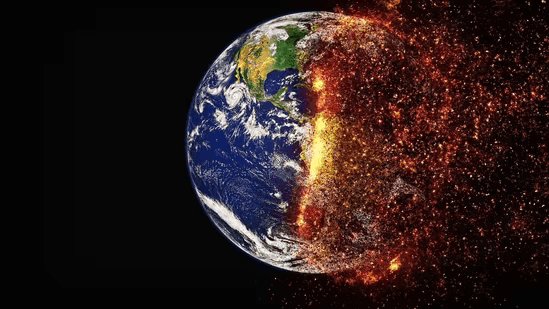In a year that will be etched in climate history, Earth recorded its hottest year ever in 2024, surpassing the critical 1.5°C global warming threshold established by the Paris Agreement. This milestone, though alarming, offers an opportunity to reflect on the implications of rising temperatures and the urgent need for action.
Here, we address five critical questions that highlight the impacts of this unprecedented heat and its broader consequences for Earth and its inhabitants.
1. What Caused 2024 to Become Earth’s Hottest Year?
The record-breaking temperatures in 2024 resulted from a combination of long-term climate trends and the intensifying effects of the El Niño weather pattern. While human activities, particularly the burning of fossil fuels, have driven global warming over decades, El Niño amplified the temperature surge by redistributing heat across the atmosphere and oceans.
This year underscored the fragility of Earth’s climate systems, which have been finely balanced for millennia.
2. How Did Ecosystems React to the Heat?
The spike in temperatures triggered cascading effects on ecosystems worldwide. Coral reefs, already under stress from prior warming events, suffered widespread bleaching. The Great Barrier Reef, one of the most iconic marine ecosystems, reported significant damage, endangering marine biodiversity and threatening communities reliant on fishing and tourism.
On land, forests faced their own set of challenges. Prolonged droughts and extreme heatwaves fueled wildfires, devastating vast areas in Canada, Australia, and the Mediterranean. These fires not only destroyed habitats but also released vast amounts of carbon dioxide, further exacerbating the warming of the planet’s atmosphere.
3. What Were the Human Costs of the Hottest Year?
The human toll of 2024’s heatwave was immense, with vulnerable populations bearing the brunt of its impacts. Heatwaves caused thousands of fatalities, particularly in regions with limited access to cooling systems. Urban areas, with their heat-absorbing infrastructure, became epicenters of heat-related illnesses.
The global population also faced economic losses as climate-related disasters intensified. Floods, wildfires, and hurricanes caused billions of dollars in damages, displacing millions of people. South Asia, in particular, faced a deadly combination of heatwaves and monsoon flooding, highlighting the fragility of heavily populated regions in the face of climate change.
4. How Did the Global Community Respond?
The breach of the 1.5°C threshold galvanized international discussions on climate action. At the United Nations Climate Change Conference (COP29) held in Brazil, leaders debated accelerated measures to transition to renewable energy and invest in climate adaptation.
While there was widespread acknowledgment of the urgency, divisions among nations hindered consensus on ambitious targets. Small island states and vulnerable nations emphasized the existential risks posed to their regions, underscoring how interconnected climate challenges have become.
The private sector also faced increased scrutiny. Companies were pressured to align their operations with science-based targets, while financial institutions came under fire for continuing to fund fossil fuel projects.
5. What Does the Future Hold If Trends Continue?
The events of 2024 underscore the trajectory of global warming and its far-reaching impacts on climate systems. While the breach of 1.5°C was temporary, scientists warn that without drastic reductions in greenhouse gas emissions, this threshold could be permanently exceeded within the next decade.
This would have catastrophic consequences for ecosystems, economies, and human health. Rising sea levels, intensified weather events, and disruptions to food and water supplies are just the tip of the iceberg. The need for transformative solutions—across policy, technology, and societal behavior—has never been more urgent.
Conclusion: A Planet at a Crossroads
Earth’s hottest year on record in 2024 serves as a dire warning and a call to action. The impacts of rising temperatures are no longer distant projections—they are a present reality affecting millions of lives and ecosystems.
As the planet faces the consequences of inaction, the responsibility lies with nations, corporations, and individuals to take decisive steps. The 1.5°C threshold was more than just a symbolic target; it was a red line that humanity is now perilously close to crossing. The planet’s resilience has limits, and the time to act is now, before the effects become irreversible.
Also Read-
1. How Did 100,000 People Flee as Los Angeles Wildfires Destroyed 1,500 Buildings?
2. Pakistan and Turkey: How Will 5 Key Challenges Shape the KAAN Jet Collaboration?




















One thought on “Earth Faces 5 Critical Questions as 2024 Becomes Hottest Year Ever Recorded”